Login
Thursday, March 5, 2026
Kanpur: National Sugar Institute, Kanpur has achieved success in producing ‘Activated Bio-char’ from sugarcane bagasse rendered surplus by the sugar factories. At present, bagasse, the fibrous material received after crushing the sugarcane is utilized mostly as a fuel.
National Sugar Institute is working on developing various value added products to enhance revenues of sugar factories and ‘Activated Bio-char’ is another such product in the series.
At present, sugar refineries use ‘Ion Exchange Resins’ to de-colorize their sugar melt to produce superior quality sugar of low colour value. However, use of such resins escalates cost of production, besides generation of substantial quantity of effluents. The product development and laboratory scale trials were aimed to assess possibilities of replacing ‘Ion Exchange Resins’ with the ‘Activated Bio-char’ produced from bagasse, informed Director, National Sugar Institute, Professor Narendra Mohan. The laboratory scale trial for decolorizing the sugar melt are encouraging with a colour reduction to the extent of 30%.The ‘Activated Bio-char’ from bagasse has been prepared by carrying out drying the bagasse, grinding and screening it to desired particle size, conducting pyrolysis under anaerobic conditions, that is in the absence of air and then activating the surface through acid treatment under controlled conditions.
About 10% recovery of ‘Activated Bio-char’ has been obtained from the bagasse. Thus, looking to the price of bagasse as Rs. 2000/- per MT, the cost of production is expected to be lower, said Shalini Kumari, Project Scientist.
RELATED ARTICLES





